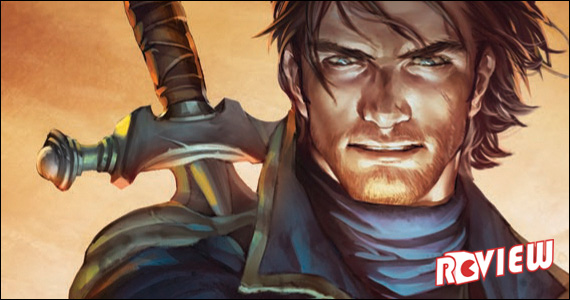
The design imperative represented in most games on the market is simple, and nigh-universal: give the player one thing to do, and develop and fortify this mechanic until it is strong enough to engage the player for the bulk of the experience. The addition of the odd mini-game (driving a tank in Gears of War, for example) serves to break up the action, but the focus of the design is still to provide a mechanic that can be successfully repeated for the entire game without becoming tedious.
Fable III represents the opposite extreme, and an entirely alternative design philosophy. Here is a game that provides a myriad of game options, with the caveat that each is relatively simplistic. The effect is that Fable III feels like a game made up of mini-games; an exploration mini-game, a finance mini-game, a combat mini-game, a social mini-game, and so on. The dilemma lies in whether players will find the sheer number of these mini-games to be sufficiently engaging as to offset the fundamental simplicity of the mechanics.
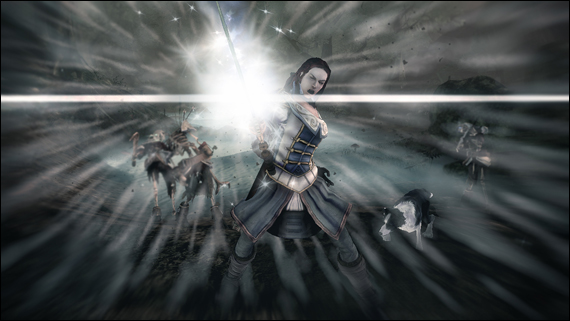
It’s difficult to describe the core gameplay, and may be more accurate to say there is no core gameplay. Combat is perhaps the most universal language of Fable III, but it feels incidental, even when mandatory, perhaps because it is mandatory so rarely, and far too easy when it is. One could conceivably play Fable for hours without fighting a single enemy, and combat is effectively impossible to lose—even if the player loses all health, he or she will immediately revive to continue the fight. These encounters are so terribly easy—even in what serve as boss battles—that challenge is effectively non-existent.
Combat also stands as a primary example of the rudimentary gameplay mechanics; players are offered three options in battle—firearms, melee, and magic—but they all play the same: tap the button for a quick attack, and hold it down more for a powerful one. Blocking is possible, but serves only to get you surrounded, so you’re better served to use the dodge roll. Since combat lacks even basic combos, you’re likely to settle into a pattern of dodging, spamming your preferred attack button, and repeating until all the enemies have fallen over.
To enhance your combat experience you can choose between swords and hammers, rifles and pistols, or a selection of magic spells, all of which will be cast identically—either as an area-affect or projectile attack. Certain powers have advantages—electricity, for example, will hold enemies in place—but these abilities never manage to create much of an element of strategy. The result is that combat goes down as uninteresting as well as unchallenging.
The upgrade path offers to increase the power of your attacks, grant you new expressions for interacting with the populace, or other similar advancements. It’s also possible to upgrade weapons by completing specific challenges, ranging from fairly simple (Make five people love you) to overly tedious (Kill two hundred enemies in the daylight). This provides sufficient impetus to keep playing, but it would have been preferable to see some more substantial upgrades available, rather than a series of power-ups for abilities you already possess.
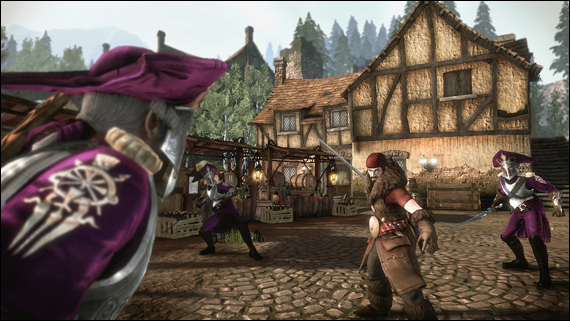
Still, Fable is not really a combat game, as there remain other, more interesting avenues to pursue. As the opening tutorials roll by, it’s easy to feel overwhelmed by the amount of information and the number of things you can do, but once you begin to play, it’s quickly understood that Fable III is a fairly straightforward game. The chief example is the interaction system, whereby players can perform friendly or mean expressions by pressing and holding the appropriate button. How you act when interacting with NPC’s will dictate their opinion of you, and can change their relationship to you, perhaps by making them your friend or even your lover.
The system feels almost immediately trite. After selecting the character you wish to interact with, and deciding whether you’d like to treat them nicely or poorly, the particular behaviour your character performs is determined by the game, not the player. For example, if you’ve purchased the right expression package on the upgrade path, the first friendly action you’re likely to perform with any character is to dance with them. If you wish to increase your relationship with that character, you need only continue to press the appropriate button, thus performing more behaviours, until they offer you a brief retrieval or date quest for their affections. While there’s a certain laughable charm to watching your character perform a whistling song and dance to impress a lady, the inevitable feeling is that Fable is a game where romance is boiled down to “Hold A to fall in love!”
If you do successfully woo some fair lady (or gentleman, as the case may be—and homosexual relationships are also possible), you can then propose (you’re guaranteed to have found an engagement ring in a pile of dirt somewhere), move into a house, and have babies. Since the only result of these actions is that you’ll have a family to perform the family-specific expressions on, you may feel that you went through all that holding of the A-button just so you could hold down the A-button some more. A player could probably spend an entire playthrough amassing friends and enemies, raising families, and engaging in wanton sex or endless niceties—but since these behaviors offer no payoff and holding down the A-button isn’t a particularly satisfying endeavor, the mechanic is more likely to be filed as irrelevant.
Players may find it more rewarding to spend down time managing the financial aspect of the game. Though you will first only earn whatever money you can find, it eventually becomes possible to buy and rent houses, or purchase businesses for a steady cut of the profits. In later stages of the game your financial decisions will become critical to the outcome of the story, so it’s fortunate that growing your financial empire is both rewarding and satisfying. Buying up land may not seem immediately thrilling, but watching the money roll in to finance more wheelings and dealings—or perhaps just the purchase of that ridiculous Faerie Hammer you’ve got your eye on—is one of the more fulfilling aspects of the game.
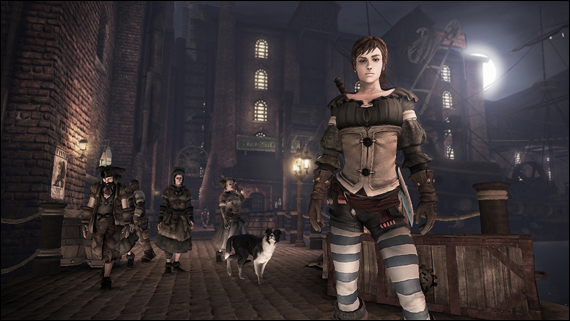
Though the mechanics at play here are simplistic, the silly, cartoonish charm and the number of options for spending your time manage to create a fairly entertaining experience. You’re not likely to get bored, since there’s always the option of wandering into the woods to kill some monsters, spending a few minutes making pies in a quicktime mini-game, bullying the people or building your empire. More importantly, Fable offers a solid line of story missions that will take you across the land of Albion, bringing allies to your cause with promises of things to come should you be made king.
Though there’s little strong connection to the characters, it remains entertaining to play out your role in the narrative, and though a fairly standard fantasy offering, the story itself presents a handful of interesting moments. The ending comes with a set of intriguing moral decisions, recognizing that you really only have the power to do great good or great evil once you have the influence you amass throughout most of the game. It’s interesting to watch your character grow and change according to the actions you take—straightforward as the effects may be—and even your weapons will change according to how you play. There’s ample room for customization in terms of clothing, hair, and tattoos, so it’s easy to create a fun (or ridiculous) character play out whatever adventure fantasy you prefer ( Magic Pirate King, thank you very much).
Perhaps the strongest element of the game is the humor, which is present everywhere you go and in everything you do. Whether it’s the charming banter of the villagers, the hilariously self-aware spoofs on RPG tropes, devious gnomes, or just a slew of chicken jokes, Fable provides a steady supply of satisfying—and often genuinely clever—humor. One quest even has you trapped in the Dungeons & Dragons style campaign of three nerd-wizards, debating how to properly construct an engaging game experience.
It’s possible to play via online co-op, which offers some intriguing possibilities by allowing players to marry each other, have children, purchase homes, and even share business ventures. The game encourages online play by reminding players that certain weapons and items can only be found in the games of other players, necessitating trading for completionists. If you’re playing with a friend, this works out extremely well—players can leverage all of the game’s assets in co-op sessions, whether they be making pies together or battling monsters—but doesn’t work very well in a random session, where you’re likely to drop in on someone who’s spending his time shopping or managing his businesses, and isn’t particularly interested in sharing either with you.
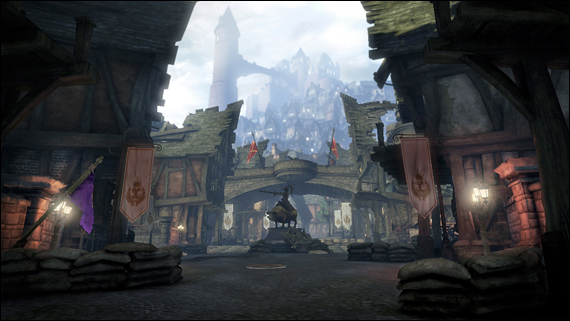
The art design here is exceptional, with a fantastic story book art style, and a lot of variety represented in the different areas and characters. However, these efforts are somewhat undercut by some significant graphical deficiencies. The engine renders muddy, unclear imagery, characterized by random slowdowns that seem completely ludicrous considering that there doesn’t appear to be any heavy-lifting for the hardware to perform. These slowdowns aren’t severe enough to significantly hinder your game, but considered alongside the underwhelming graphical execution, the unfortunate reality is that Fable is simply not rendered with the fidelity that the art deserves.
One particularly clever design element is the near-abolishment of traditional menu systems, which are used only when absolutely necessary. Menus are instead represented as physical spaces—an armory and wardrobe for your inventory, and a treasure room for your wealth and achievements. Even the upgrade system is presented as a physical space the player can interact with. This goes a long way toward immersing the player in the experience. However, the map system is unfortunately weak and useless for basic navigation—lacking even a clear indication of where in the current area the player is actually standing. This is mitigated by the omni-present golden path, with will lead you to whatever objective you deem necessary, but the ineffectual maps are bound to impede any exploratory efforts. This is unfortunate, since exploration is going to be fairly critical to completionists; there are numerous rewards to be found through treasure hunting and collection quests, as well as areas of the world that won’t be unlocked through normal story progression, and have to be sought out.
It’s also important to note that some technical difficulties have clearly not been ironed out. Lag is a recurring problem when playing co-operatively, and while playing I encountered one glitch that prevented me from fast-traveling and also from accessing the important upgrade path. This issue eventually resolved itself, but it remained frustrating to be unable to do the things I wanted to do during the time in which these features were non-functional.
Fable may offer rudimentary mechanics that can sometimes fail to engage, but with the clever humor and the level of minutia available, it manages to create a complete experience for playing out a fantasy adventure. There’s charm in the same simplicity that can hold back some of the game mechanics, and though the game is sometimes greater than the sum of its rudimentary parts, players may find themselves craving something more substantial.
Lionhead Studios
Publisher
Microsoft Game Studios
System
Xbox 360
Modes
Singleplayer, Co-op
Release Date
October 26, 2010
*A copy of this title was provided by the publisher for review
